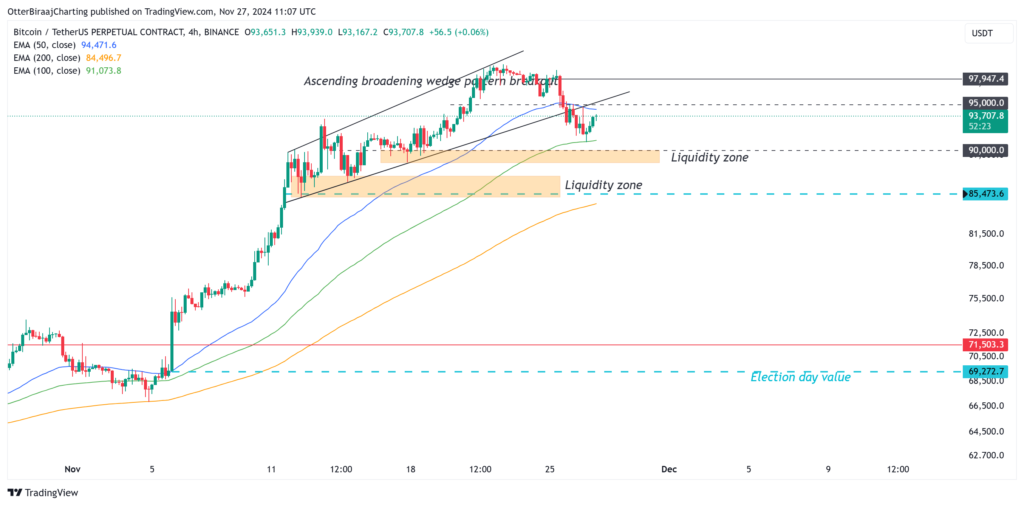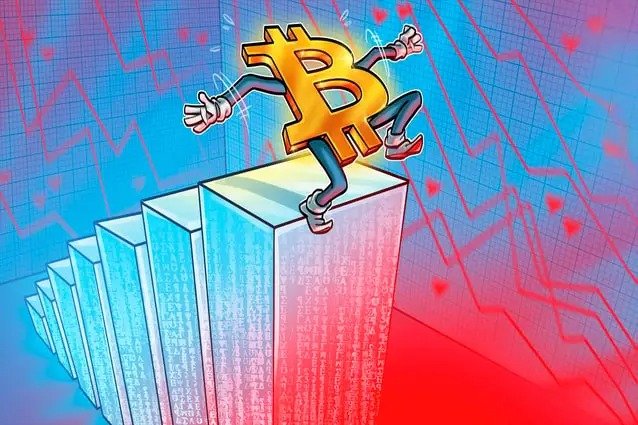Bitcoin attracts investors, traders, and financial enthusiasts worldwide. Bitcoin, the first cryptocurrency, has seen some of the most severe price fluctuations in history. Since its launch, the cryptocurrency has experienced multiple violent falls, raising questions: Will the price of Bitcoin crash again?
Bitcoin fell below $95,000 on Nov. 25, breaking an upward-expanding wedge pattern. The crypto asset has found support at the 100-day EMA, but overhead resistance from the 50-day EMA and the $95,000 price range may prevent a recovery to $99,000. With altcoins recovering quicker than BTC, commentators disagree on whether Bitcoin will correct or reach $100,000.
Understanding Bitcoin’s Price Volatility
Since its launch, the price of Bitcoin has changed. Bitcoin has demonstrated that significant price fluctuations are in its nature, as evidenced by its historic top of over $69,000 in November 2021, from its initial price of less than $1. But why the volatility? Will Bitcoin’s Price Drop Once More? Understanding these components is necessary to provide an answer to this question.
Market Speculation
Bitcoin prices are heavily influenced by speculation. Hedge funds, institutional players, and individual investors drive price fluctuations. Good news like huge firms adopting Bitcoin or favorable regulatory rulings usually boosts prices. Bad news, such as security breaches or governmental crackdowns, can drastically lower prices.
Global Economic Factors
Global factors like inflation, currency devaluation, and monetary policy affect Bitcoin’s price. Bitcoin’s “haven” status boosts demand during economic turmoil. However, when traditional markets settle, investors may sell Bitcoin, lowering its price.
Regulation and Legal Concerns
Because Bitcoin is an uncontrolled asset, market movements can be greatly influenced by government restrictions. Bitcoin prices have fluctuated sharply in response to regulatory changes in nations with sizable cryptocurrency markets, such China and the US. Clear and consistent restrictions may stabilize the market, but a significant regulatory crackdown could lead to another price drop.
Second Bitcoin Aim Is Still 20.7% Away
Bitcoin has plummeted almost 5% in two days, but independent expert Javon Marks expects a short-term “pullback”. Marks said on X that Bitcoin should hit “Target 2” at $113,386, 20.7% from its current price range, based on history and trend. BTC researcher Axel Adler Jr. said on-chain the market is “bullish.” Most long-term investors preserve their allocations, according to Adler Jr. BTC value days destroyed were below 2. VDD scores over 2.9 indicate greater spending, which often terminates Bitcoin bull runs.
 At $77,800, Crypto Banter inventor Ran Neuner targeted the CME gap. The expert expects BTC to drop to $73,000 after 21 days if prices fall below the range. Based on impulse wave pattern, Cryptotoad, an anonymous expert, proposed “lower numbers”. Meanwhile, commodities and index trader Horse predicted a retest zone between $88,500 and $82,000. Auction market theory and volume profile predict Bitcoin will rebound next month.
At $77,800, Crypto Banter inventor Ran Neuner targeted the CME gap. The expert expects BTC to drop to $73,000 after 21 days if prices fall below the range. Based on impulse wave pattern, Cryptotoad, an anonymous expert, proposed “lower numbers”. Meanwhile, commodities and index trader Horse predicted a retest zone between $88,500 and $82,000. Auction market theory and volume profile predict Bitcoin will rebound next month.
Factors Affecting Bitcoin’s Price in 2024
Multiple factors determine Bitcoin’s 2024 price. Bitcoin investment strategy and stability require banking and business adoption. Retail and institutional speculating reduce short-term volatility. Bitcoin hedges inflation and currency devaluation, especially in uncertain economic times. Regulation is key. Clear cryptocurrency laws in the U.S. and EU give Bitcoin security and legitimacy, attracting institutional and individual investors. The Lightning Network makes Bitcoin more popular for daily use by improving scalability and transaction efficiency. Features prevent 2024 Bitcoin declines.
Bitcoin May Repeat Thanksgiving Dump
December markets climb, but Thanksgiving may tumble. BTC corrected in November 2020, reaching $19,633 but failing to break $20,000. Q1 2021 saw the price surpass its psychological milestone two weeks later. Charles Edwards, founder of Capriole Fund, says BTC is bullish on Wednesdays (Nov. 27). The asset averaged a Thanksgiving correction from 2019 to 2023. Daily candles above $95,000 confirm Bitcoin’s bullishness. If BTC fails to rise over its 50-day EMA in 24 hours, it may plummet near $90,000.
Is Another Bitcoin Price Crash Likely?
Bitcoin’s price decreases are unpredictable, but 2024’s big dip looks implausible. Institutional use and clearer rules stabilize Bitcoin. Retail speculation increases volatility, but institutional investors plan. Bitcoin’s rising popularity as an inflation hedge increases its price, especially in hard times. The bitcoin market is volatile, so emotion or regulation can influence values. Bitcoin’s maturity and institutional investment may lessen 2024’s high-risk cryptocurrency price collapse. Investments require caution and knowledge.
Also Read: Why Is Today’s Cardano Price Lower?
In Summary
Bitcoin, the first cryptocurrency, has varied in price since its introduction, generating crash fears. After rising, Bitcoin fell below $95,000 against strong moving average resistance. Bitcoin experts disagree on whether it will rebound or reach $100,000.Market speculation, global economic conditions, and regulations cause Bitcoin volatility. Negative news significantly lowers prices, whereas positive news raises them.
As a safe haven during economic downturns, inflation and currency devaluation affect Bitcoin’s price. Lightning Network, institutional adoption, and tougher legislation affect Bitcoin’s 2024 price. Some experts predict short-term price decreases, while others gain. Institutional and regulatory stability may prevent a 2024 Bitcoin disaster despite volatility.
[sp_easyaccordion id=”2290″]









